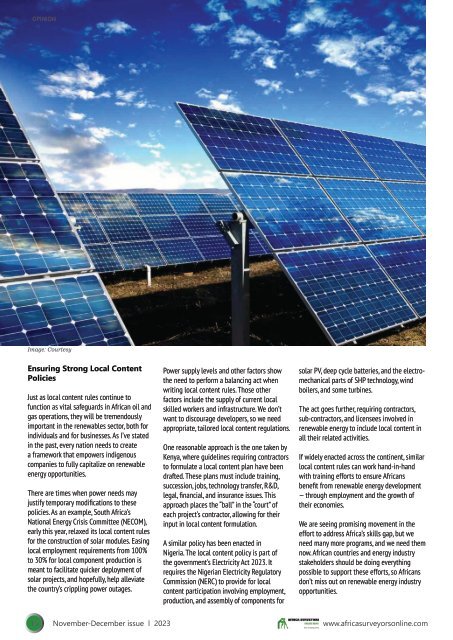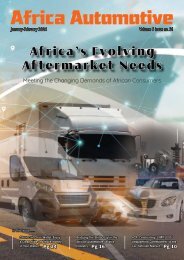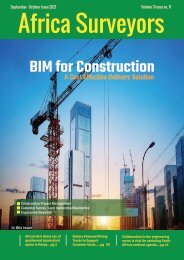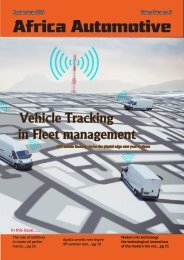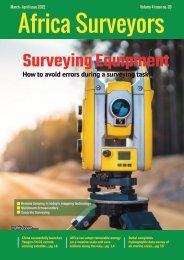Africa Surveyors November-December issue 2023
Africa Surveyors is Africa’s premier source of Surveying, Mapping and Geospatial news and an envoy of surveying products/service for the Construction, Maritime, Onshore & Offshore energy and exploration, Engineering, Oil and Gas, Agricultural and Mining sectors on new solution based trends and technology for the African market.
Africa Surveyors is Africa’s premier source of Surveying, Mapping and Geospatial news and an envoy of surveying products/service for the Construction, Maritime, Onshore & Offshore energy and exploration, Engineering, Oil and Gas, Agricultural and Mining sectors on new solution based trends and technology for the African market.
You also want an ePaper? Increase the reach of your titles
YUMPU automatically turns print PDFs into web optimized ePapers that Google loves.
OPINION<br />
Image: Courtesy<br />
Ensuring Strong Local Content<br />
Policies<br />
Just as local content rules continue to<br />
function as vital safeguards in <strong>Africa</strong>n oil and<br />
gas operations, they will be tremendously<br />
important in the renewables sector, both for<br />
individuals and for businesses. As I’ve stated<br />
in the past, every nation needs to create<br />
a framework that empowers indigenous<br />
companies to fully capitalize on renewable<br />
energy opportunities.<br />
There are times when power needs may<br />
justify temporary modifications to these<br />
policies. As an example, South <strong>Africa</strong>’s<br />
National Energy Crisis Committee (NECOM),<br />
early this year, relaxed its local content rules<br />
for the construction of solar modules. Easing<br />
local employment requirements from 100%<br />
to 30% for local component production is<br />
meant to facilitate quicker deployment of<br />
solar projects, and hopefully, help alleviate<br />
the country’s crippling power outages.<br />
Power supply levels and other factors show<br />
the need to perform a balancing act when<br />
writing local content rules. Those other<br />
factors include the supply of current local<br />
skilled workers and infrastructure. We don’t<br />
want to discourage developers, so we need<br />
appropriate, tailored local content regulations.<br />
One reasonable approach is the one taken by<br />
Kenya, where guidelines requiring contractors<br />
to formulate a local content plan have been<br />
drafted. These plans must include training,<br />
succession, jobs, technology transfer, R&D,<br />
legal, financial, and insurance <strong>issue</strong>s. This<br />
approach places the “ball” in the “court” of<br />
each project’s contractor, allowing for their<br />
input in local content formulation.<br />
A similar policy has been enacted in<br />
Nigeria. The local content policy is part of<br />
the government’s Electricity Act <strong>2023</strong>. It<br />
requires the Nigerian Electricity Regulatory<br />
Commission (NERC) to provide for local<br />
content participation involving employment,<br />
production, and assembly of components for<br />
solar PV, deep cycle batteries, and the electromechanical<br />
parts of SHP technology, wind<br />
boilers, and some turbines.<br />
The act goes further, requiring contractors,<br />
sub-contractors, and licensees involved in<br />
renewable energy to include local content in<br />
all their related activities.<br />
If widely enacted across the continent, similar<br />
local content rules can work hand-in-hand<br />
with training efforts to ensure <strong>Africa</strong>ns<br />
benefit from renewable energy development<br />
— through employment and the growth of<br />
their economies.<br />
We are seeing promising movement in the<br />
effort to address <strong>Africa</strong>’s skills gap, but we<br />
need many more programs, and we need them<br />
now. <strong>Africa</strong>n countries and energy industry<br />
stakeholders should be doing everything<br />
possible to support these efforts, so <strong>Africa</strong>ns<br />
don’t miss out on renewable energy industry<br />
opportunities.<br />
16 <strong>November</strong>-<strong>December</strong> <strong>issue</strong> l <strong>2023</strong> www.africasurveyorsonline.com


